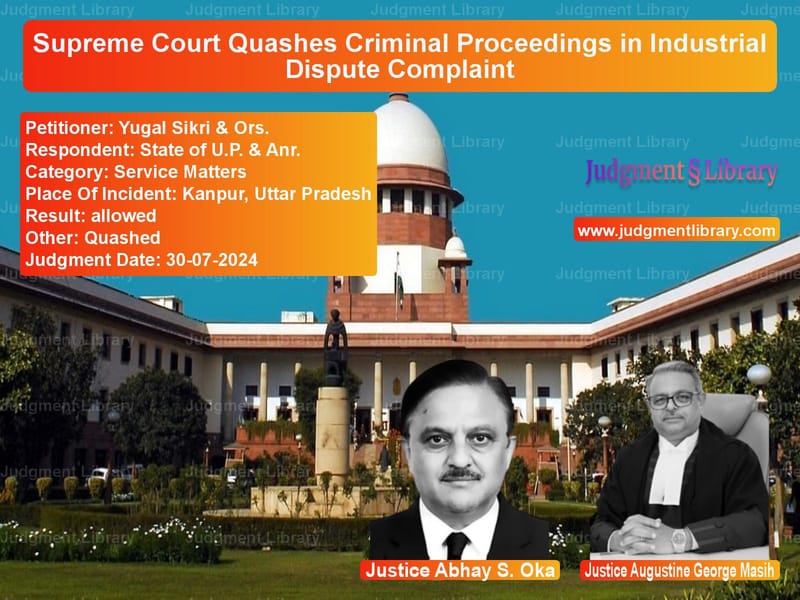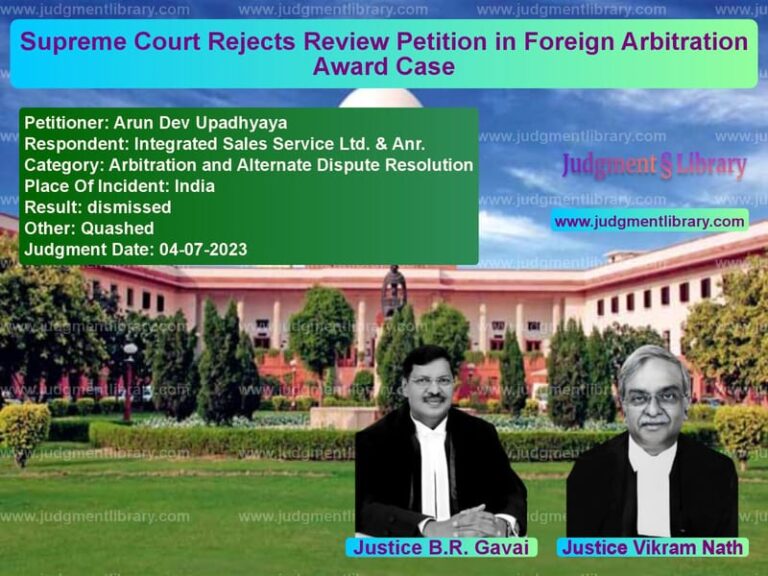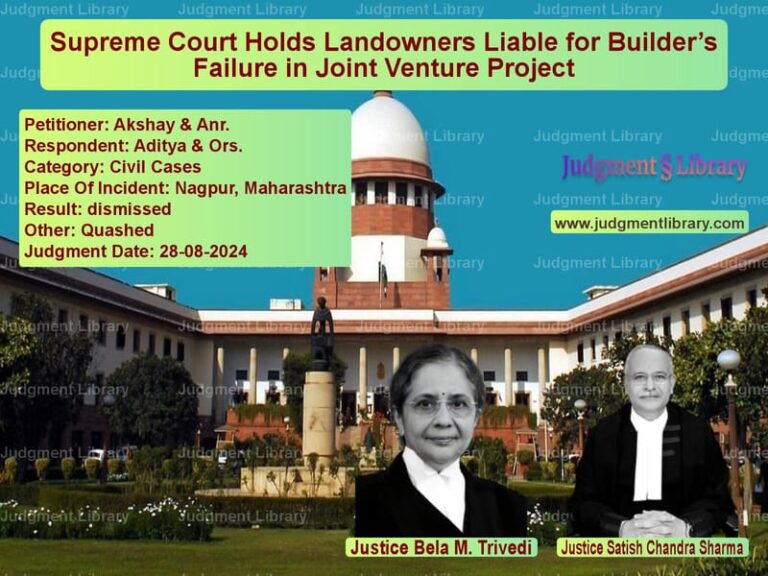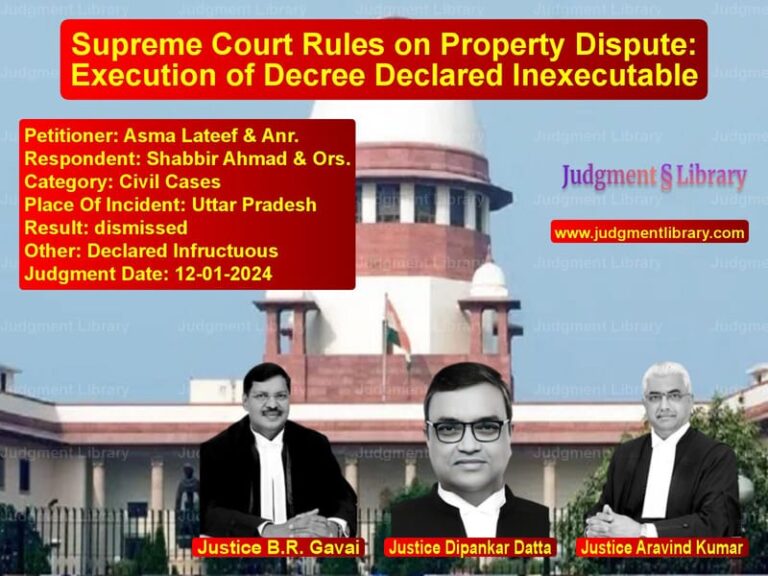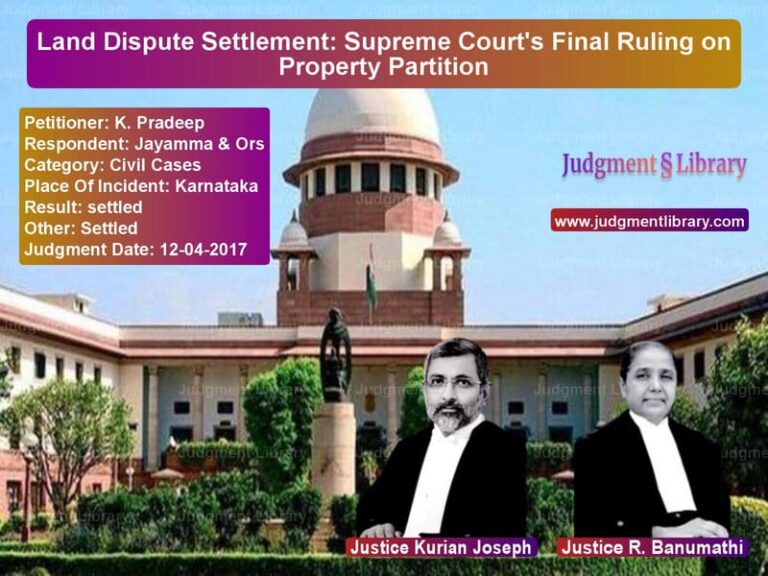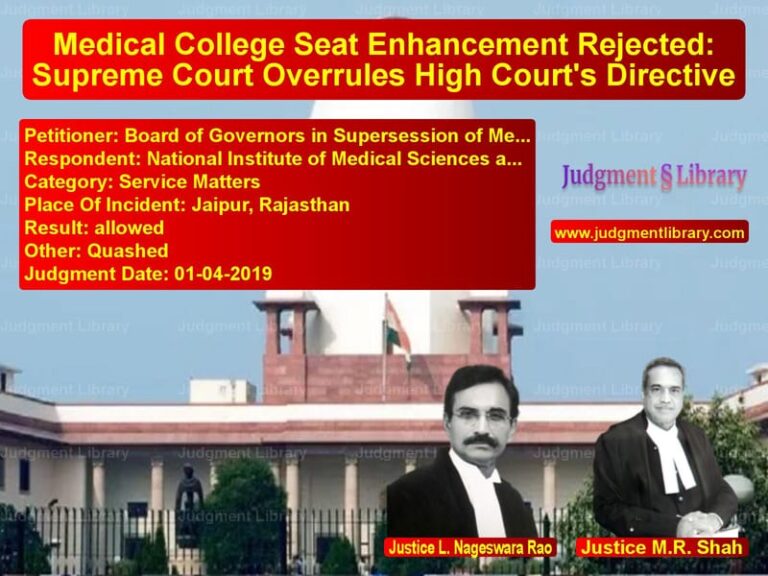Supreme Court Quashes Criminal Proceedings in Industrial Dispute Complaint
The Supreme Court of India has delivered a significant judgment in the case of Yugal Sikri & Ors. v. State of U.P. & Anr., ruling on the improper invocation of criminal law in an industrial dispute. The case revolved around a complaint alleging the violation of Section 29 read with Sections 32 and 34 of the Industrial Disputes Act, 1947 (ID Act). The Court examined the procedural lapses in taking cognizance of the complaint and the essential elements required to prosecute offenses under the ID Act.
Background of the Case
The appellants, led by Yugal Sikri, had filed a petition under Section 482 of the Code of Criminal Procedure, 1973 (CrPC), seeking to quash a complaint filed against them. The complaint, filed in a criminal court by the second respondent, alleged a violation of Section 29 of the ID Act, which pertains to breaches of settlements or awards that are binding under the Act. The High Court dismissed the petition without examining the merits of the challenge, leading to an appeal before the Supreme Court.
Key Legal Issues Before the Supreme Court
- Whether the complaint sufficiently alleged a breach of a settlement or award under Section 29 of the ID Act.
- Whether the complaint was filed in compliance with Section 34(1) of the ID Act, which mandates that offenses under the Act can only be prosecuted based on a complaint made by or under the authority of the appropriate government.
- Whether the magistrate had properly applied judicial mind before issuing process.
Petitioner’s Arguments
The appellants argued:
- Section 29 of the ID Act applies only when there is a breach of a settlement or award binding under the Act, but the complaint lacked any reference to such a settlement.
- Under Section 34(1) of the ID Act, only complaints filed by or under the authority of the appropriate government are cognizable. The second respondent, a private individual, lacked the authority to initiate the complaint.
- The magistrate failed to consider these legal deficiencies before taking cognizance and issuing the summoning order.
Respondent’s Arguments
The second respondent contended:
- The complaint alleged a violation of an agreement incorporated in a joint affidavit submitted before the Allahabad High Court.
- The agreement, though not formally termed as a settlement under the ID Act, should be considered binding as it was acknowledged by the parties.
- High Courts should be slow in interfering with the trial process under Section 482 CrPC.
Supreme Court’s Observations
The Supreme Court analyzed the complaint and the procedural requirements under the ID Act and CrPC. The Court made the following key observations:
1. Necessity of a Settlement or Award Under Section 29
The Court held that Section 29 of the ID Act applies only when there is a breach of a settlement or award as defined under the Act. Since the complaint did not cite any settlement meeting the statutory definition, it failed to establish a violation.
Read also: https://judgmentlibrary.com/supreme-court-dismisses-pension-claim-of-up-roadways-retired-officials/
2. Lack of Proper Authorization Under Section 34(1)
The Court found that the complaint was filed without proper authorization from the appropriate government. It emphasized that Section 34(1) is a safeguard against frivolous complaints, ensuring that only serious violations are prosecuted.
3. Failure of the Magistrate to Apply Judicial Mind
The Court criticized the magistrate for issuing process without scrutinizing the legal deficiencies in the complaint. It reaffirmed that setting criminal law in motion has serious consequences and cannot be done casually.
Final Judgment
The Supreme Court ruled:
- The High Court’s dismissal of the petition was erroneous and was set aside.
- The criminal complaint and summoning order were quashed.
- The second respondent was given the liberty to pursue remedies available under civil or labor laws.
Implications of the Judgment
This ruling reinforces the principle that criminal law cannot be invoked arbitrarily in labor disputes. It ensures that complaints under the ID Act must meet statutory requirements before prosecution is initiated.
The judgment sets a precedent for industrial relations, clarifying that procedural safeguards must be strictly followed to prevent misuse of criminal proceedings in employment-related disputes.
Petitioner Name: Yugal Sikri & Ors..Respondent Name: State of U.P. & Anr..Judgment By: Justice Abhay S. Oka, Justice Augustine George Masih.Place Of Incident: Kanpur, Uttar Pradesh.Judgment Date: 30-07-2024.
Don’t miss out on the full details! Download the complete judgment in PDF format below and gain valuable insights instantly!
Download Judgment: yugal-sikri-&-ors.-vs-state-of-u.p.-&-anr.-supreme-court-of-india-judgment-dated-30-07-2024.pdf
Directly Download Judgment: Directly download this Judgment
See all petitions in Employment Disputes
See all petitions in Workplace Harassment
See all petitions in Public Sector Employees
See all petitions in Termination Cases
See all petitions in Disciplinary Proceedings
See all petitions in Judgment by Abhay S. Oka
See all petitions in Judgment by Augustine George Masih
See all petitions in allowed
See all petitions in Quashed
See all petitions in supreme court of India judgments July 2024
See all petitions in 2024 judgments
See all posts in Service Matters Category
See all allowed petitions in Service Matters Category
See all Dismissed petitions in Service Matters Category
See all partially allowed petitions in Service Matters Category

